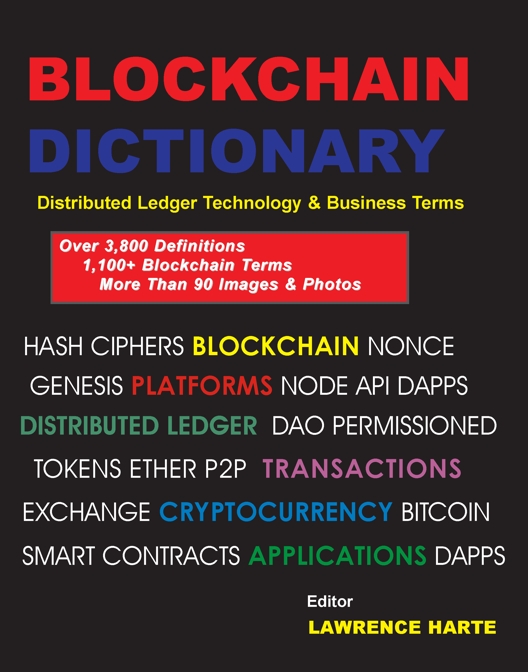Blockchain Dictionary
More than
3,127 Terms and Definitions
| Cover | Description |
 | Blockchain . Over 3,000 key
Blockchain Terms and Definitions along with
+
30+ diagrams and photographs!!! |
| Format | Pages | Price |
| Book | 228 | $39.95 |
|
|
Sample Blockchain Definitions
51% Attack-A 51% attack is the means by which information in the blockchain can be hacked. In order to attack or hack the blockchain, more than half of the blockchain users or more than half of the total computing power involved on the blockchain must be actively involved in the attack. This is the only way that conflicting transactions can occur on the blockchain.
Alternative Coin (Altcoin)-An Altcoin is any digital currency (cryptocurrency) that is similar to Bitcoin which operates using a group transaction verification minding process and distributed ledger.
Bitcoin-Bitcoin is a an encrypted digital currency (cryptocurrency) which operates using a group transaction verification minding process and distributed ledger. Bitcoin started on 3 January 2009.
Block Chain (Blockchain)-A blockchain is a type of distributed accounting system (ledger) that contains groups (blocks) of digitally processed transactions which are unchangeably linkedin to other blocks of data in a single complete file which is available for viewing and storage to all members of the blockchain.
Blockchain Node-A blockchain node is connectable communication address (IP address) that provides access and processing to a distributed ledger in a blockchain system. Blockchain node sare replicas or copies of the blockchain ledger that individuals can use to keep track of the transactions that have occurred. There are both full nodes and lightweight/ light nodes. A full node is a complete list of each and every transaction that has occurred on the blockchain, while a light node is only a partial list of the transactions.
Blockchain Platform-A blockchain platform is a set of architectures and procedures that enables applications to use blockchain functions and services. Blockchain platforms can speed up and simplify application development by letting the platform do the encryption, block chaining, token management, and other complicated blockchain activities.
Central Ledger-A central ledger is collection of financial accounts that is stored and managed by a central company or service.
Computational Effort-Computational effort is the amount of processing steps (such as the number of floating point operations) that are necessary to complete a task (such as a processing and blockchain block). The amount of computational effort may be increased to increase the amount of time required to complete a task.
Crypto-Currency (Cryptocurrency)-A cryptocurrency is a digital monetary exchange value (such as tokens) which use encryption techniques verify and protect the transfer of funds which can operate independently of a banking system.
Cryptography-Cryptography is a form of data manipulation that protects the identity, integrity, and privacy of information that is transferred through a communication system. Cryptography uses keys and mathematical formulas to convert information into a form that requires the recipient of the information to use a key to decode the information back to its original form. Encrypted information cannot be decoded (or is not easily decoded) by another recipient of the information without a key.
Digital Currency-A digital currency is a financial unit measurement of value that is defined by an authorized entity.
Digital Wallet-A digital wallet is a system used to store identification information, accounts and value(s) in digital form, in the accounts that can be used to purchase items or enable a person or the device they control to perform actions or access services.
Distributed Ledger-A central distributed is collection of financial accounts that is stored and managed by a multiple companies and/or services. Transactions in the distributed ledger may be assigned access levels - �permissioned� or �unpermissioned� to control who can see and update the records.
Encryption-Encryption is the process of protecting voice or data information from being obtained by unauthorized users. Encryption involves the use of a data processing algorithm (formula program) that uses one or more secret keys that both the sender and receiver of the information use to encrypt and decrypt the information. Without the encryption algorithm and key(s), unauthorized listeners cannot decode the message. When the encryption and decryption keys are the same, the encryption process is known as symmetrical encryption. When different encryption and decryption keys are used (such as in a public encryption system), the process is known as asymmetrical encryption.
Hash-A hash is a one way calculation process that produces a unique result number or code. A hash code only provides a validation of information because it can�t be converted back into its original data.
Initial Coin Offering (ICO)-An initial coin offering is an event that allows the purchase of blockchain tokens in exchange for capital or other valuable resource.
Ledger-A ledger is an append-only record store, where records are immutable and may hold more general information than financial records.
Miner-A blockchain miner is and information process which competes to validate transactions that will be added to a blockchain distributed ledger. Miners receive rewards (such as token coins) if their blockchain processing verification is accepted and the processed block is added to the distributed ledger.
Peer to Peer (P2P)-Peer to peer is a communication network that allows people or devices that are connected to it to directly communicate with each other.
Smart Contracts-Smart contracts contain a set of terms and obligations that have been agreed to by two or more entities which can be automatically monitored and fulfilled.
Token-A token is a unit of value for something that can be owned and exchanged. Token unit values may be established by the marketplace (such as bitcoins) or they may be associated with specific items (such as banana coins). Tokens may be provided for ledger transaction processing services (mining).
Transaction Validation Incentives-A transaction validation incentive is a value (commissions or fixed amounts) that is awarded to people or systems that perform and validate transactions (such as miners) for the blockchain.
back to top
|
|
